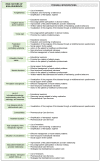Medication Non-Adherence in Rheumatology, Oncology and Cardiology: A Review of the Literature of Risk Factors and Potential Interventions
- PMID: 36231341
- PMCID: PMC9564665
- DOI: 10.3390/ijerph191912036
Medication Non-Adherence in Rheumatology, Oncology and Cardiology: A Review of the Literature of Risk Factors and Potential Interventions
Abstract
Medication adherence is directly associated with health outcomes. Adherence has been reviewed extensively; however, most studies provide a narrow scope of the problem, covering a specific disease or treatment. This project's objective was to identify risk factors for non-adherence in the fields of rheumatology, oncology, and cardiology as well as potential interventions to improve adherence and their association with the risk factors. The project was developed in three phases and carried out by a Steering Committee made up of experts from the fields of rheumatology, oncology, cardiology, general medicine, and hospital and community pharmacy. In phase 1, a bibliographic review was performed, and the articles/reviews were classified according to the authors' level of confidence in the results and their clinical relevance. In phase 2, 20 risk factors for non-adherence were identified from these articles/reviews and agreed upon in Steering Committee meetings. In phase 3, potential interventions for improving adherence were also identified and agreed upon. The results obtained show that adherence is a dynamic concept that can change throughout the course of the disease, the treatments, and other factors. Educational interventions are the most studied ones and have the highest level of confidence in the authors' opinion. Information and education are essential to improve adherence in all patients.
Keywords: adherence; cardiology; compliance; medication; oncology; rheumatology; treatment.
Conflict of interest statement
A.B. has received grants, research support, or fees for consultancies or lectures from Abbvie, BMS, Fresenius, Galapagos, Gilead, MSD, Novartis, Nordic, Lilly, Pfizer, Roche, Sanofi, Sandoz, UCB. B.B. has received project and consulting fees from Pfizer. J.M.C. has received lecture fees from Ferrer, Servier, Pfizer, and Bayer and consulting fees from Ferrer and Pfizer. V.F.G.-G., C.V.y.L., E.M.-C., J.d.l.H.-R., and J.G.-M. have no conflict of interest.
Figures
References
-
- World Health Organization . Adherence to Long Term Therapies: Evidence for Action. World Health Organization; Geneva, Switzerland: 2003.



